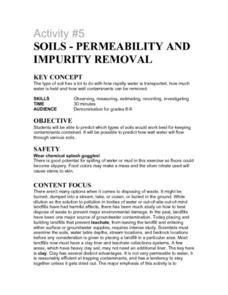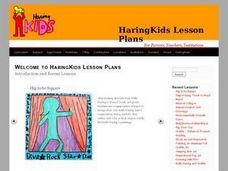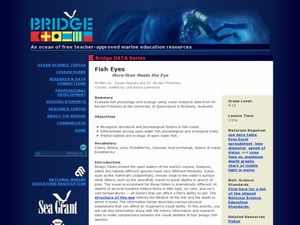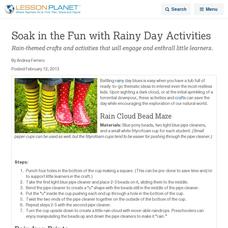Curated OER
Places and Spaces in Art
Students examine and describe the houses of Baie Saint-Paul. They name the colors used and the shapes in the roof. Using a gable roof design, they draw their own house. They discover the architectrual elements in their own community...
Curated OER
Am I Neutral? pH Properties in Soil
Students participate in a science lab to determine the pH of three different soil samples. Students conduct an experiment by creating a question, a hypothesis and then an investigation of soil samples. Then they compare colors apprearing...
Curated OER
Let's Paint!
Students read "Frida" and "Miranda's Smile" and discuss these artists styles. They practice painting and compare it to what they have been taught about the drawings. Students are shown how to use tempera or watercolor paints. They are...
Curated OER
IDP Introduction
Fourth graders examine the three regions of North Carolina through class discussion of favorite places in the state and a review game based on the game of twister. The different colors on the twister sheet represent the different...
Curated OER
Rainbow in a Baggie
Students create rainbows in a bag. In this art activity, students create rainbows using cornstarch, water, sugar and food coloring.
Curated OER
Chemical Bonding
Eighth graders identify the three main types of chemical bonds. In this chemistry lesson, 8th graders draw Lewis dot diagrams of elements and determine the bond formed. They create a model water molecule.
Twiggle Magazine
Preschool Color Fun and Activities
I can't stress enough the importance of songs and rhyming chants to the development of early literacy skills. To reinforce color recognition, little ones sing, count, move, and create. All you have to do is choose which of these great...
Curated OER
Activity #5 Soils-Permeability and Impurity Removal
Middle schoolers predict which types of soils would work best for keeping contaminants contained. They comprehend that in the past, landfills have been one major source of groundwater contamination. Pupils comprehend that placing and...
Curated OER
Mixtures
Students are introduced to the concept of mixtures. They identify materials used to make mixtures and describe what happens to the individual materials when they are mixed. In groups, they make bubbles by mixing water and soap together...
Curated OER
K-O
In this color worksheet, students color ocean animals specified colors. Animals include six animals: a dolphin, a shark, an octopus, a starfish, a crab and a fish. Each animal contains a smiling face and is swimming in the water....
Curated OER
The Tale of Peter Rabbit
Wow! Here is a most-impressive series of lessons and activities that revolve around the classic story, The Tale of Peter Rabbit. The purpose of the lessons are to provide an agricultural theme in the reading, writing, and science...
Curated OER
Spectrophotometry Lab
Students use a machine called a spectrophotometer to determine how much light is absorbed by certain substances. Students record the absorbance and the % of light transmitted for different color solutions, graph their results, and then...
Curated OER
Mixing Up Magic
Pupils explore the relationship between art and science through experimenting with color, design and recycled materials and creating their own art work.
Curated OER
Underwater Vision
Students use colored lights and fabric to study an underwater ocean scene. In this light study instructional activity, students draw a picture using colored markers and hypothesize what their drawing will look like using filters....
Curated OER
What is a Watershed, Anyway?
Students constrct a watershed and write about their observations. Students use maps to locate their area in relation to the watershed and inquire about what is applied to the ground above.
Curated OER
Hide & Seek Butterflies
Students examine a variety of butterflies and discuss how they believe they get their color variations. In groups, they brainstorm the advantages and disadvantages of their color schemes. To end the lesson, they watch butterflies in...
Curated OER
Fish Eyes - More than Meets the Eye
Inform your class about the adaptations in fish eyes: cones, lens size, endothermy, and speed of vision. The adaptations are related to diving behavior. Junior marine scientists compare the adaptations of four different fish species to...
Curated OER
Soak in the Fun with Rainy Day Activities
Rain-themed crafts and activities that will engage and enthrall little learners.
Curated OER
Mixed Media Ocean Art
Students design pictures of ocean environments. In this art lesson, students use mixed media art materials to develop a picture that depicts the ocean environment. They use paint, sand paper and various basic art materials.
Desert Discoveries
Creating a Garden Journal
Youngsters create science journals which are used to record observations from the school garden. The goal of this activity is to help kids tune into nature by making daily observations on the growth of the plants, and also to take note...
Curated OER
pH: Acids and Bases
In this scientific investigation worksheet, students follow the provided procedures to examine the pH levels of acid and bases and then respond to 1 short answer question.
Curated OER
Bathymetric Mapping
Students draw contour lines based on NOAA soundings on a nautical chart. They color the contours and glue label tags for topographic features. They determine that the floor of the ocean is composed of hills, plains, ridges, trenches,...
Curated OER
World Continents
Students identify the continents of the world. In groups, students create a three-dimensional clay representation of their assigned continent. Using KidPix software, they draw and color their continent. Students research their continent...

























